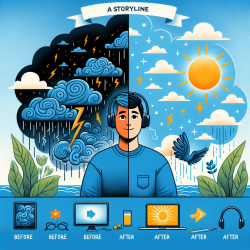The mental health of university students is a growing concern, with increasing levels of stress, anxiety, and depression reported across campuses. Traditional counseling services are often overwhelmed and unable to meet the rising demand. However, a recent study offers a promising alternative: an 8-week web-based mindfulness program that has shown significant results in alleviating some of these mental health challenges.
The Study: A Closer Look
The research titled "Effectiveness of an 8-Week Web-Based Mindfulness Virtual Community Intervention for University Students on Symptoms of Stress, Anxiety, and Depression: Randomized Controlled Trial" explored the impact of a mindfulness-based virtual community (MVC) on undergraduate students. Conducted at a large Canadian university, the study involved 160 students who were randomly assigned to either the MVC intervention or a waitlist control group.
Program Structure and Methodology
The MVC intervention was designed to integrate mindfulness and cognitive-behavioral therapy (CBT) principles through various online components:
- Video-Based Modules: Twelve modules provided psychoeducation and applied mindfulness practices tailored to students' life challenges.
- Discussion Forums: Anonymous peer-to-peer forums facilitated discussions on depression, anxiety, and stress.
- Live Videoconferences: Group-based sessions led by professionals offered real-time guidance and support.
The primary outcomes measured included symptoms of depression, anxiety, and stress, while mindfulness was considered a secondary outcome. Assessments were conducted at baseline and eight weeks post-intervention using validated scales like the Patient Health Questionnaire-9 (PHQ9) and Beck Anxiety Inventory (BAI).
Key Findings
The results were compelling. The MVC group experienced significant reductions in depression and anxiety scores compared to the control group. Specifically:
- Depression Scores: Reduced by an average of 2.21 points (P=.01).
- Anxiety Scores: Reduced by an average of 4.82 points (P=.006).
- Mindfulness Scores: Increased significantly (P=.02).
Interestingly, there was no significant change in perceived stress levels between the groups. This suggests that while the program effectively addressed depression and anxiety, additional strategies might be needed to tackle stress.
Implications for Practitioners
This study highlights the potential for online mindfulness interventions to complement traditional mental health services in educational settings. For practitioners looking to enhance their skills or explore new avenues for supporting student well-being, implementing similar web-based programs could be highly beneficial. Key takeaways include:
- Scalability: Online platforms can reach large student populations at a lower cost than in-person services.
- Anonymity: Virtual environments provide privacy, reducing stigma associated with seeking help.
- Flexibility: Students can engage with content at their own pace and convenience.
The Path Forward
The success of this program underscores the need for further research into online mental health interventions. Future studies could explore long-term effects beyond the initial eight weeks or investigate additional components that might enhance stress reduction.
If you're interested in delving deeper into this research or considering its application within your practice, I encourage you to explore the full study. To read the original research paper, please follow this link: Effectiveness of an 8-Week Web-Based Mindfulness Virtual Community Intervention for University Students on Symptoms of Stress, Anxiety, and Depression: Randomized Controlled Trial.
This study not only provides valuable insights into innovative mental health strategies but also serves as a call to action for educators and practitioners to embrace digital tools in supporting student well-being.










